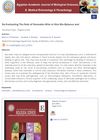 3 citations,
January 2024 in “Liver International”
3 citations,
January 2024 in “Liver International” Targeting thyroid hormone receptor α in liver cells may help treat liver fibrosis.
3 citations,
April 2022 in “Neuroscience Letters” Finasteride may help treat autism by reducing inflammation and oxidative stress.
 July 2023 in “Health science reports”
July 2023 in “Health science reports” Alopecia Areata is linked to a higher risk of several diseases, which vary with age and sex.
 August 2022 in “Aesthetic Cosmetology and Medicine”
August 2022 in “Aesthetic Cosmetology and Medicine” Certain plant extracts can effectively and safely reduce seborrhea when used in properly formulated scalp care products.
 March 2022 in “Egyptian Academic Journal of Biological Sciences. E, Medical Entomology and Parasitology”
March 2022 in “Egyptian Academic Journal of Biological Sciences. E, Medical Entomology and Parasitology” Demodex mites might help skin balance by eating bacteria, but their role in skin disorders is unclear and may involve other factors.
April 2019 in “The journal of investigative dermatology/Journal of investigative dermatology” A compromised gut may trigger the autoimmune hair loss condition Alopecia Areata.
October 2022 in “Biomolecules” Allopregnanolone can reduce gut inflammation and normalize neurotransmitter levels after finasteride withdrawal.
365 citations,
November 2018 in “Journal of Allergy and Clinical Immunology” People with atopic dermatitis have different skin bacteria, and targeting these bacteria might help treat the condition.
194 citations,
October 2018 in “Microbiome” Acne is linked to complex skin microbe interactions, and new findings suggest microbiome-based treatments could be effective.
181 citations,
December 2017 in “Trends in immunology” Intestinal intraepithelial lymphocytes are crucial for gut immunity and maintaining the mucosal barrier.
48 citations,
May 2018 in “Expert Opinion on Therapeutic Targets” Gut health may influence Alopecia Areata, suggesting new treatments.
36 citations,
August 2022 in “Molecular Therapy — Nucleic Acids” Gene therapy shows promise for healing chronic wounds but needs more research to overcome challenges.
 17 citations,
January 2020 in “Skin appendage disorders”
17 citations,
January 2020 in “Skin appendage disorders” Certain diets may help with hair growth in people with different types of hair loss.
 9 citations,
December 2022 in “Phytomedicine”
9 citations,
December 2022 in “Phytomedicine” More high-quality research is needed to recommend flavonoids and saponins for clinical use.
 9 citations,
May 2021 in “Frontiers in Cell and Developmental Biology”
9 citations,
May 2021 in “Frontiers in Cell and Developmental Biology” DNA methylation changes in women with PCOS could be used as disease markers and suggest new treatment targets.
 8 citations,
September 2021 in “Journal of Cosmetic Dermatology”
8 citations,
September 2021 in “Journal of Cosmetic Dermatology” Some diets and supplements might help with skin disorders, but their effectiveness varies and more research is needed.
 6 citations,
May 2022 in “Colloids and Surfaces B: Biointerfaces”
6 citations,
May 2022 in “Colloids and Surfaces B: Biointerfaces” Eating peptides from certain shellfish may help wounds heal faster by reducing inflammation.
 6 citations,
January 2021 in “Frontiers in Immunology”
6 citations,
January 2021 in “Frontiers in Immunology” Certain immune cells worsen post-surgery gut paralysis by activating a specific immune response.
 6 citations,
April 2019 in “Nutrients”
6 citations,
April 2019 in “Nutrients” Biotin is important for keeping zinc levels balanced in the skin and its lack can cause hair loss.
4 citations,
April 2022 in “Microorganisms” Povidone iodine reduced skin bacteria more than chlorhexidine gluconate, but neither met FDA reduction standards.
4 citations,
October 2021 in “Microorganisms” Men with androgenetic alopecia have different scalp oils and microbes compared to those without.
 2 citations,
May 2022 in “Cosmetics”
2 citations,
May 2022 in “Cosmetics” Further research is needed to understand how the microbiome affects hair loss in Alopecia Areata.
 1 citations,
July 2023 in “Frontiers in Immunology”
1 citations,
July 2023 in “Frontiers in Immunology” Oxidative stress and immune dysfunction are linked to both Hashimoto's thyroiditis and polycystic ovary syndrome, with diet and specific treatments important for managing these conditions.
 1 citations,
May 2021 in “Cell Host & Microbe”
1 citations,
May 2021 in “Cell Host & Microbe” Skin bacteria, specifically Streptococcus and Staphylococcus, help in hair regrowth after skin injury and speed up wound healing.
 1 citations,
October 2020 in “Journal of Investigative Dermatology Symposium Proceedings”
1 citations,
October 2020 in “Journal of Investigative Dermatology Symposium Proceedings” The summit concluded that new treatments like Jak inhibitors show promise for Alopecia Areata and personalized approaches are needed.
 September 2024 in “Cosmoderma”
September 2024 in “Cosmoderma” Biotin doesn't help hair growth in healthy people and can cause health risks if overused.
August 2024 in “Nutrients” Probiotics help reduce hair loss and increase hair growth in people with androgenic alopecia.
 May 2024 in “European Journal of Immunology”
May 2024 in “European Journal of Immunology” Vitamin B5 and coenzyme A may help regulate the immune system and could improve treatments for chronic diseases and cancer.
April 2024 in “Journal of clinical medicine research” Seborrheic alopecia in young people is linked to fungal infections, especially Malassezia.
 April 2024 in “Scientific reports (Nature Publishing Group)”
April 2024 in “Scientific reports (Nature Publishing Group)” Rosemary and neem extract may be an effective natural treatment for dandruff and hair loss.


















